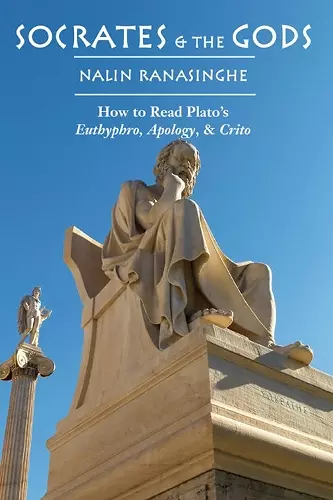Socrates and the Gods – How to Read Plato`s Euthyphro, Apology, and Crito
Format:Hardback
Publisher:St Augustine's Press
Published:30th Sep '12
Should be back in stock very soon

Socrates and the Gods is the first book-length treatment of the Apology and its two supporting dialogues: the Euthyphro and Crito. These works are closely read and analyzed in a way that both takes into account their historic-cultural context (Homer, Greek tragedy, and the Peloponnesian War) and recognizes how Socrates refuses to be determined by material or mimetic necessity. The carefully argued interpretations arrived at are not distorted or skewed by a priori assumptions held by most political or analytic philosophers; it is not assumed that Socrates is either a cynical atheist who despised and deceived the rabble or an unsophisticated crank with little to offer a post-humanist Philosopher of Mind.
Socrates’ distinctive take on the gods is essential to understanding the meaning of Socrates’ life, death, and self-proclaimed divine mission. The Euthyphro shows how Socrates overturns Homeric religion in a way that subtly but definitively establishes the philosophical basis of Christian Revelation. Determined to allow the Apology of Socrates to speak for itself, Plato uses the persona of Euthyphro, who almost certainly did not exist, to represent Meletus and the problem of religious literalism in a godless age. Socrates’ reinterpretation of Homer is shown to overcome the pervasive Oedipal antagonisms of the Iliad and bequeath posterity a healthier view of the respective roles played by divine and human elements in the Cosmos.
Only the Euthyphro prepares the reader to approach Plato’s Apology with an adequate understanding of the issues, philosophical and politico-theological, at stake. Decisively refuting the currently fashionable dogma of Socrates’ atheism, Socrates’ mission consists in confounding false or reified claims to divine knowledge that are used to deny the ability of the human person to practice virtue. Socrates simultaneously affirms revelation and denies the capacity of prophets to serve as exegetes of their own winged utterances. The Apology will be shown to recover the better part of Homer’s legacy: the resilient soul of Odysseus, Socrates’ preferred alter ego, and to firmly establish the soul’s essential capacities to practice moral virtue and engage in exegetical interaction with inspired texts.
The Crito is a dramatic treatment of the problem of Socrates’ intellectual and spiritual legacy. Socrates is anxious to show Crito that the pursuit of philosophy does not end with...
ISBN: 9781587317798
Dimensions: 238mm x 158mm x 26mm
Weight: 538g
256 pages